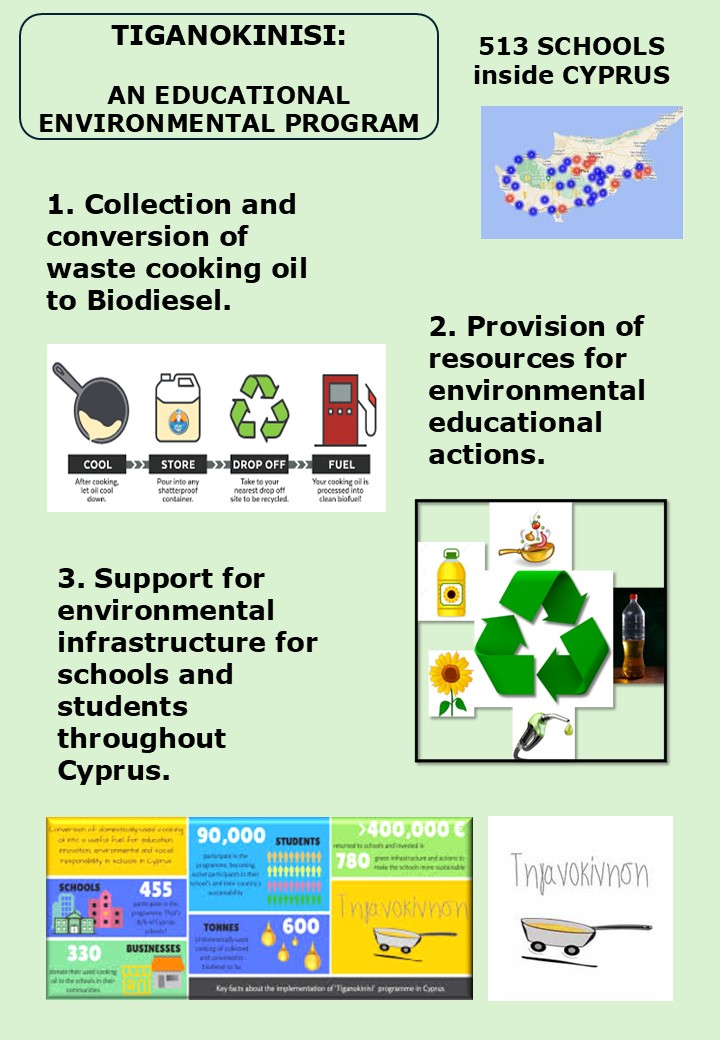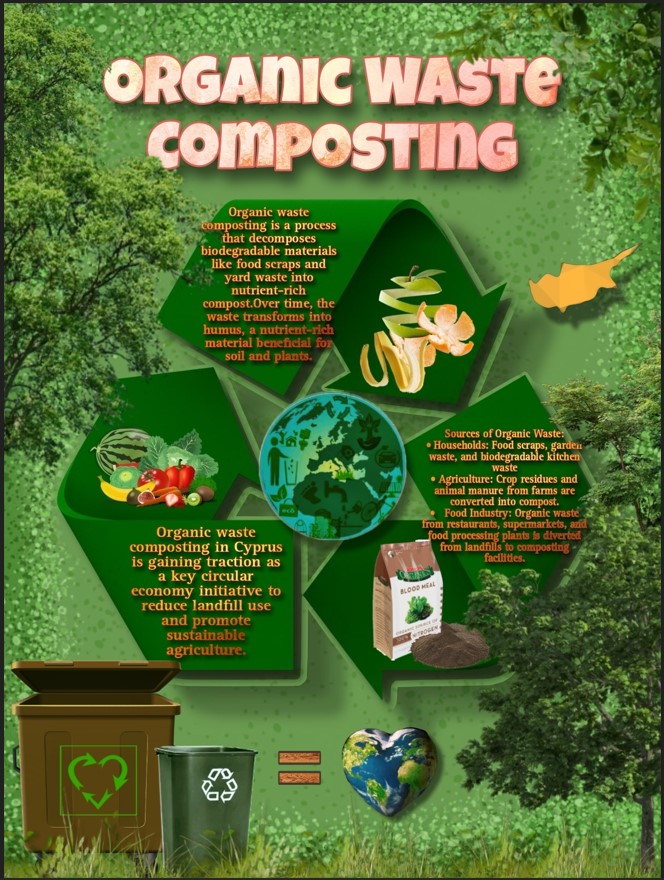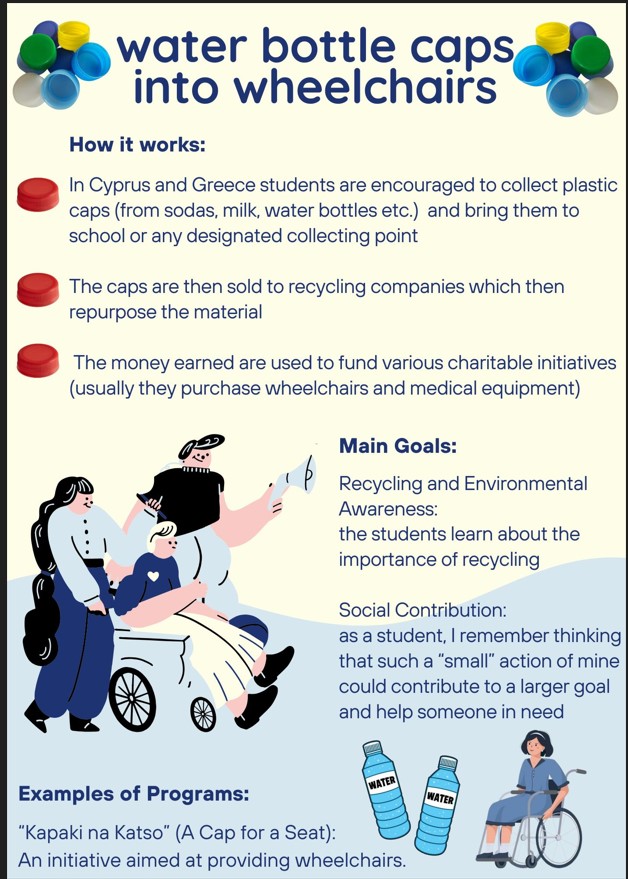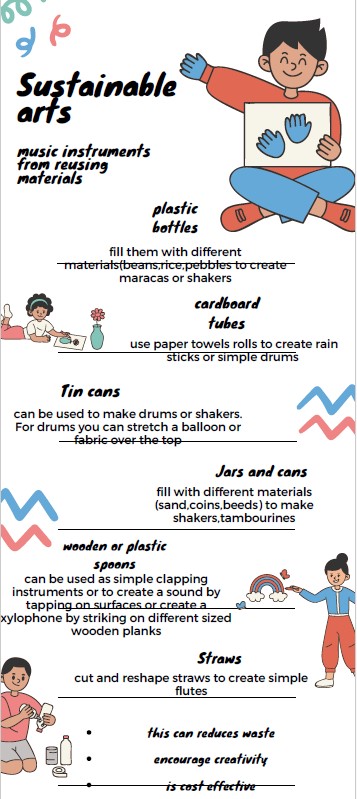Cyprus PA
Participants from Cyprus (from both organisations) had an online meeting, and they decided to work on different themes from our national innovation activities. So they got prepared with a lot of different research and posters as follows:.

After a short rundown of the project, Mr. Nikolas Nikolaou, president of NGO ACPELIA, spoke about the responsibilities of the participants for the upcoming project. Split into teams with their greatest strengths, participants set on to work on their responsibilities, which are homework focusing on green innovation and circular economy, innovative ideas, and more. The results of which you can see below
Research on Circular Economy and Green Innovation in Cyprus
Tiganokinisi Poster
Tiganokinisi, meaning "frying pan movement" in Greek, is an educational and environmental program in Cyprus that focuses on collecting used cooking oil (UCO) from households and converting it into biodiesel. Implemented in over 400 schools across the country, the initiative is led by the AKTI Project and Research Centre in collaboration with the Cyprus Pedagogical Institute, under the auspices of the Ministry of Education, Culture, Sport, and Youth.
Circular Economy EuropeThe program operates by encouraging students to bring UCO from their homes to designated collection points at their schools. AKTI collects the oil and sells it to companies that transform it into biodiesel. The proceeds are then returned to the schools, with each receiving approximately €500–600 per tonne of collected oil. These funds are invested in green infrastructure and technologies, such as botanical gardens, waste management systems, and renewable energy installations, thereby promoting sustainable practices within the school environment.
Since its inception in 2012, Tiganokinisi has achieved significant milestones:
Participation: Approximately 85% of all schools in Cyprus are involved in the program.
Ευρωπαϊκός Κοινωνικός Τομέας ΠλέονEnvironmental Impact: The program has collected over 400 tonnes of UCO, preventing improper disposal and contributing to environmental protection.
SDGsFinancial Returns: More than €300,000 have been returned to schools, facilitating the implementation of over 780 sustainable practices.
SDGs
Tiganokinisi not only addresses waste management challenges but also serves as a practical educational tool, fostering environmental consciousness among students and the broader community. By integrating circular economy principles into the educational system, it empowers young individuals to adopt and promote sustainable behaviors, thereby contributing to the overall well-being of the environment and society.

Tiganokinisi presentation:
Poster Organic Waste Composting in Cyprus
Organic waste composting in Cyprus is gaining momentum as an effective and sustainable solution to manage biodegradable waste and promote environmental conservation. With increasing awareness of waste management challenges, initiatives such as community composting programs and municipal projects are encouraging households, schools, and businesses to adopt composting practices. By converting organic waste like food scraps, garden trimmings, and biodegradable materials into nutrient-rich compost, Cyprus is addressing landfill overcrowding and reducing greenhouse gas emissions. Several municipalities have introduced compost bins and educational campaigns to support residents in composting at home, while organizations are implementing large-scale composting systems to serve agricultural and urban needs. These efforts not only mitigate the environmental impact of waste but also contribute to soil enrichment and the circular economy, aligning with the island's commitment to sustainable development and EU waste management directives.

Poster for Water bottle caps into wheelchairs in Cyprus
The "Water Bottle Caps into Wheelchairs" program in Cyprus is a remarkable initiative that combines environmental sustainability with social impact. Through this program, individuals and organizations collect plastic bottle caps, which are then recycled to generate funds for purchasing wheelchairs and other mobility aids for people in need. Managed by charitable organizations and often supported by schools, businesses, and community groups, the initiative raises awareness about the importance of recycling while fostering a spirit of solidarity and care for individuals with mobility challenges. By turning a simple everyday action—collecting bottle caps—into a meaningful contribution, the program not only reduces plastic waste in the environment but also transforms lives, making mobility accessible to those who might otherwise face significant barriers.

Poster for Sustainable Arts in Cyprus
Sustainable arts in Cyprus, including music and visual arts, are thriving as creative communities embrace eco-conscious practices to inspire environmental awareness and cultural sustainability. Musicians, artists, and event organizers are incorporating recycled materials, renewable energy, and sustainable methods into their work, producing art that reflects a deep respect for nature and the local heritage. Initiatives such as eco-friendly music festivals, upcycled art exhibitions, and workshops on sustainable crafting have gained momentum, engaging audiences in conversations about ecological responsibility. By blending traditional Cypriot techniques with modern sustainability concepts, artists are creating works that celebrate the island's rich cultural identity while advocating for a greener future. These efforts not only reduce the environmental impact of artistic production but also promote education and inspire collective action for sustainable living across Cyprus.

Presentation
Research for Sustainable Traditional Houses in Cyprus
Research into sustainable traditional houses in Cyprus focuses on integrating eco-friendly practices with the island's rich architectural heritage. Traditional Cypriot houses, known for their thick stone walls, clay roofs, and inner courtyards, offer natural insulation and ventilation, providing a sustainable model for modern housing. Researchers are exploring ways to enhance these features by incorporating renewable energy systems, such as solar panels, and using locally sourced, sustainable materials for restoration and construction.
The aim is to preserve the cultural identity of these homes while improving energy efficiency and reducing environmental impact. Pilot projects and studies emphasize adapting traditional design principles to modern needs, ensuring functionality, durability, and ecological balance. These efforts contribute to sustainable development in Cyprus by promoting energy conservation, minimizing waste, and showcasing how heritage architecture can be a cornerstone for a greener future.
Presentation of the research

